Ed Gorman's Blog, page 138
January 21, 2013
Swarming a Book Online
Swarming a Book Online
By DAVID STREITFELD FROM THE NEW YORK TIMES
Reviews on Amazon are becoming attack weapons, intended to sink new books as soon as they are published.In the biggest, most overt and most successful of these campaigns, a group of Michael Jackson fans used Facebook and Twitter to solicit negative reviews of a new biography of the singer. They bombarded Amazon with dozens of one-star takedowns, succeeded in getting several favorable notices erased and even took credit for Amazon’s briefly removing the book from sale.“Books used to die by being ignored, but now they can be killed — and perhaps unjustly killed,” said Trevor Pinch, a Cornell sociologist who has studied Amazon reviews. “In theory, a very good book could be killed by a group of people for malicious reasons.”In “Untouchable: The Strange Life and Tragic Death of Michael Jackson,” Randall Sullivan writes that Jackson’s overuse of plastic surgery reduced his nose to little more than a pair of nostrils and that he died a virgin despite being married twice. These points in particular seem to infuriate the fans.Outside Amazon, the book had a mixed reception; in The New York Times, Michiko Kakutani called it “thoroughly dispensable.” So it is difficult to pinpoint how effective the campaign was. Still, the book has been a resounding failure in the marketplace.The fans, who call themselves Michael Jackson’s Rapid Response Team to Media Attacks, say they are exercising their free speech rights to protest a book they feel is exploitative and inaccurate. “Sullivan does everything he can to dehumanize, dismantle and destroy, against all objective fact,” a spokesman for the group said.
FOR THE REST GO HERE:
http://www.nytimes.com/2013/01/21/bus...
Published on January 21, 2013 10:24
January 20, 2013
Bob Levinson on John Ford
MONDAY, NOVEMBER 27, 2006 Re my comments about John Ford the other night Bob Levinson noted:
1. Ford won more Oscars than any other director. None for a western, although "Stagecoach" was nominated. The wins: "The Informer," "The Grapes of Wrath," "How Green Was My Valley," "The Quiet Man." He didn't write 'em, but he sure knew how to get 'em on the screen. (Thinking about it, "The Quiet Man" is sort of a western in civvies, with an Irish brogue...)
2. Ford wasn't a right winger (like Wayne). When C.B. DeMille was pushing the Directors Guild to oust president Joe Manciewicz and other lefties, it was Ford who stood up to DeMille and won.
3. Think it was "Sgt. Rutledge" that dared build a (military) western around a black lead, Woody Strode. That was 1960, and a first.
4. "Red River" is the best western Ford never made. Hawks, but you constantly hear movie buffs (so-called) mistake it for Ford.
(later from Bob)
Agree with how you peg Ford's vision of the west, but he was always a man who preferred myth to reality (including the one he continually manufactured for himself as a director). Think "The Man Who Shot Liberty Valance." "The Searchers" is a terrific film, one I've seen a number of times, but even here, were Ford playing full fair with the truth, Ethan Edwards er would have killed Debbie once he had her, knowing what the Indians would have turned her into, etc., etc. Ford always had one eye on the screen, the other on the box-office, and the eyepatch made it impossible to always detect which was which. ; )
Making an excuse for Hollywood "back when," since the cameras first rolled, the concern was always for box-office and that invariably meant serving the public's need for escapism and uplifting themes; truth be damned, if necessary. Exceptions abound, of course, but you don't find them a lot of them listed among the top grossers overall. People like DeMille, going all the way back to "The Squaw Man," and Ford caught on fast and used it to create and fortify their own myth of directorial greatness.
The Mann (Stewart) movies, excellent; ditto Boetticher's output. Fuller was possibly the one writer-director least distracted by entertainment protocols. "The Steel Helment." "Park Row."
"Pickup on South Street." "The Big Red One." On and on, but never the box-office returns of a Ford or DeMille. Peckinpah and "The Wild Bunch"...
(later)
When I was that kid collecting autographs, often stationed myself along with other "hounds" at Paramount's DeMille gate, the major drive-on point for stars, about thirty or so feet from the DeMille building. Whenever DeMille appeared, he was always pleasant, polite and gracious to us, always coming over when someone called out for an autograph.
(Our home is about a mile from his home atop DeMille Drive...)
When Ford was prepping the "What Price Glory" Fox remake, he staged the play at Grauman's Chinese as a one-night fund-raiser, hoping it would convince Tracy and Cagney to co-star. They were in the audience, watching an all-star cast perform, including stars in bit parts, e.g., Wayne with one line as a wounded soldier). I asked for his autograph after he parked and headed for the stage door; got a grunt as well as a signature. (Cagney wound up co-starring with Dan Dailey after Tracy refused to be second-billed to his old drinking buddy...)
Here's an add-on I may have written you once before (or maybe it was to Bill Crider). I bought my way into Grauman's and the show that night, a buck and a quarter for what turned out to be an aisle seat in the last row of the orchestra section. Cagney and Tracy were seated side by side in the front row. When I saw them, I made a beeline down, autograph book and pen in hand, and made the signing request. Both were notorious for not signing, more so Tracy than Cagney. Cagney wondered if I should be there doing this, but took the book and signed. Tracy refused, so I challenged him--as only a kid could do--wondering how he had said no when Mr. Cagney had said yes. He gave me a look, took the book, and signed...
Published on January 20, 2013 18:33
January 19, 2013
Listen to Harlan Ellison, Richard Matheson, Roger Anker, and Chris Beaumont Memorialize Author Charles Beaumont
Listen to Harlan Ellison, Richard Matheson, Roger Anker, and Chris Beaumont Memorialize Author Charles Beaumont
By John DeNardo | Saturday, January 19th, 2013 at 12:15 am Leave your comment
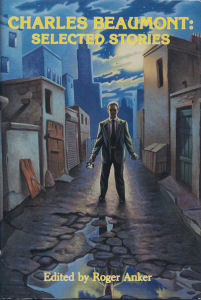
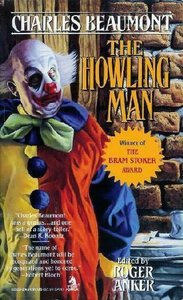
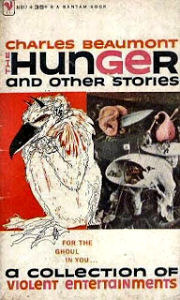 Listen to Harlan Ellison, Richard Matheson, Roger Anker, and Chris Beaumont Memorialize Author Charles Beaumont
Listen to Harlan Ellison, Richard Matheson, Roger Anker, and Chris Beaumont Memorialize Author Charles BeaumontEd here: Charles Beaumont was one of the finest horror-suspense writers of his generation. He has long deserved major rediscovery. As this fascinating audio tape will demonstrate, you should read or reread him him asap. His work is filled with both beauty and terror. This is from the great website SF SIGNAL.
By John DeNardo | Saturday, January 19th, 2013 at 12:15 am
Twenty years after the death of Charles Beaumont in 1967, the sf/f radio program Hour 25 held a memorial episode for him. Here is the audio of Harlan Ellison, Richard Matheson, Roger Anker, and Charles’ son Chris Beaumont talking about Charles Beaumont.Great listening…
go here to listen:
http://www.sfsignal.com/archives/2013...
Published on January 19, 2013 13:40
January 18, 2013
Remembering John D. MacDonald's pulp fiction by Fred Blosser
Remembering John D. MacDonald's pulp fiction by Fred Blosser
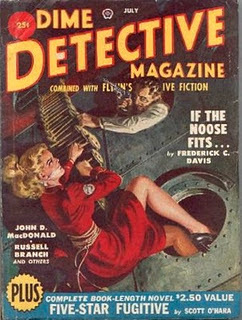
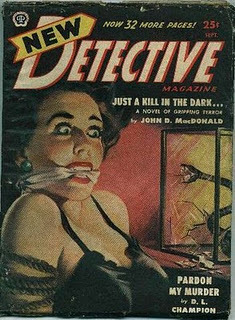
Remembering John D. MacDonald's pulp fiction by Fred Blosser
Years ago, as a fledgling enthusiast of pulp and paperback fiction, I was a big fan of the legendary JDMBibliophile ‘zine. I was especially fond of the “Early JDM” column, in which Francis M. Nevins Jr. profiled MacDonald’s pulp stories from Black Mask, Dime Detective, and other such wonderful treasuries of hardboiled fiction.
Several of those stories, with JDM’s blessings, were eventually collected by Martin H. Greenberg, Nevins, Walter Shine, and Jean Shine in the two “Good Old Stuff” volumes of the 1980s. But many others remain unreprinted. This is unfortunate, because nuggets of tough-guy gold repose in those now-crumbling pulpwood pages. As cases in point, I would refer you to two novelettes from Dime Detective that show MacDonald at his youthful peak as a riveting storyteller.
I wrote about those stories in the Spring 1992 issue of The JDM Review, and what follows is an updated recap of the article. I figure that most of you are unfamiliar with the 1992 article. Twenty years later, with pulp making a resurgence of sorts with e-books and POD houses, it may be a good time for a reminder as to how energetic MacDonald’s magazine work was.
First, “Call Your Murder Signals!” (Dime Detective, June 1948). As in most of JDM’s pulp stories, the protagonist of this 12,000-word effort isn’t the typical private eye or police detective pulp hero. Benjamin “Tige” Gaynor, war hero and former All-American lineman, is coach of a pro football team called the Port Davis Travelers.
When Tige runs afoul of a crooked gambling ring, local gangsters try to kill him. Failing that, they frame him for the murder of a former player. With a pert young woman on his side, Gaynor clears his name and brings the bad guys to lead-laced justice. (Man, pulp lingo is contagious.)
From the first page, in which Tige is shot and pushed out of a speeding car on a lonely country road, “Call Your Murder Signals!” is textbook-perfect pulp. JDM keeps the plot moving at high velocity, while throwing in the occasional twist of phrase that presages his mature Gold Medal style:
“Without knowing how it happened, I was on my face in the shallow ditch, and my hands were no longer tied. My right arm was twisted under me at a funny angle. I burned in a dozen places. My cheek rested in a puddle, and the rain beat down on me.
“The legs were gone, too. Oh, they were there, but they were old stockings filled with sand and putty.”
The blurb on the magazine’s contents page is pure pulp platinum: “Snap into kill formation, boys, and -- CALL YOUR MURDER SIGNALS! When the trigger toughs tried to bench him for keeps, All-American Gaynor decides he’d rather do-in than die.”
Incidentally, by that June 1948 cover date, Dime Detective no longer sold for 10 cents. Cover price: 15 cents.
Another placid town seething with hidden corruption, Hunt City, is the setting for “Too Many Sinners” (Dime Detective, June 1949). Johnny Rogan, a “tall, hardy-looking young man with a firm jaw, friendly blue eyes, and a shock of yellow hair,” is a soft-hearted repo man. Assigned to repossess a car for a bank, he encounters a prostitution and extortion ring, a deceptively cherubic old man named Esperance whose enemies have a way of disappearing suddenly, and a lethal beauty named Carlotta.
In the 1992 article, mentioning Carlotta, I suggested that readers visualize Barbara Carrera in a 1940s pageboy hairdo. Now I would suggest Eva Mendes, Sofia Vergara, maybe Eva Longoria.
With a plot slightly reminiscent of Hammett’s “The Scorched Face” (in the 1992 article, I goofed and inexplicably cited Hammett’s “Fly Paper”), “Too Many Sinners” may strike modern readers as dated, at least in regard to details of technology. Esperance drugs local young women, puts them into what the tabloids used to call compromising positions, and uses the photos to blackmail the women or force them into turning tricks. Nowadays, I guess sex videos or on-line porn would be involved.
As in “Call Your Murder Signals!”, JDM keeps the action rocketing along. There’s a masterful sequence in which Johnny, tied up in his car and doused with gasoline, struggles to free himself before a lighted cigarette burns down and ignites the petrol.
The blurb for this one is even better than the one for the 1948 novelette:
“A thrill-starved girl’s fury cremates -- TOO MANY SINNERS. She was just a brunette on a skip list -- steering Johnny to hell."
In between the beatings, shootings, and stabbings, the mundane details of Rogan’s repo job have an authentic ring. One suspects that JDM drew on his own brief career in repossessing cars and appliances while putting himself through college.
Incidentally, if you think “Call Your Murder Signals!” and “Too Many Sinners” push the limits of corn, consider that two other titles in the June 1949 issue were “A Sap Takes the Rap” and “Tin-Lizzy Houdini.” As noted in the “Good Old Stuff” collections, the titles of MacDonald’s pulp stories were often changed as they crossed the editor's desk. Whatever the title, they deserve better than the impermanence of brittling pulpwood pages.
Published on January 18, 2013 13:57
January 17, 2013
The most humble man in Hollywood: Steven Spielberg by Ken Levine
TUESDAY, JANUARY 15, 2013
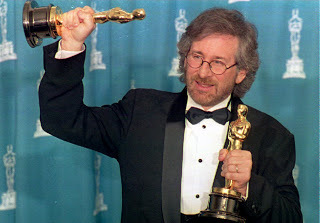 The most humble man in Hollywood: Steven SpielbergEd here: The politics of the Academy Awards has always fascinated me. P.T. Barnum had nothing on the guys and gals who try and advert their client to modestly accepting his/her award for all humanity. But Ken Levine posts that all previous spectacular assaults on common sense and good taste have now been surpassed by Steven Spielberg.
The most humble man in Hollywood: Steven SpielbergEd here: The politics of the Academy Awards has always fascinated me. P.T. Barnum had nothing on the guys and gals who try and advert their client to modestly accepting his/her award for all humanity. But Ken Levine posts that all previous spectacular assaults on common sense and good taste have now been surpassed by Steven Spielberg.Ken Levine:In Daniel Day-Lewis’ acceptance speech at the Golden Globes he fawned all over Steven Spielberg and praised him for his “humility.” Steven nodded graciously as if to say, “Yes, that’s me alright.” And I thought – humility? On what planet are we on here? This man has one of the largest egos in the ego capital of the world. He is enormously talented. There’s no denying that. And he has made some wonderful films. This isn’t Michael Bay we’re talking about. I have tremendous respect for Steven Spielberg as a filmmaker.
But “humility?” Gimme a break! This is the man who orchestrated getting a former president of the United States to introduce his film clip at a made-up award ceremony. It wasn’t enough to have some pompous thespian like Jeremy Irons regale the world with what a genius he is, he had to have the former leader of the free world. And make no mistake -- it was Steven who arranged it. Seeing Bill Clinton at the Golden Globes was like seeing Paul McCartney singing at the new Jiffy Lube grand opening in Pacoima.
A humble man might’ve thought that was overkill.
Who is he going to get to introduce his film at the Academy Awards? I bet he has his staff looking into the Second Coming. I can just see it -- Seth MacFarlane sings a show tune about masturbation and then in his “Stewie” voice introduces Jesus Christ.
for the rest go here:
http://kenlevine.blogspot.com/2013/01...
Published on January 17, 2013 09:42
January 16, 2013
Amazon May Already Have Reached 50% Market Share of the U.S. Fiction Book Market Across All Formats
Amazon May Already Have Reached 50% Market Share
of the U.S. Fiction Book Market Across All Formats
from Book Gorilla-Thanks to Libby Hellman for the link Amazon's website 1.0, Aug. 1995By Steve Windwalker
Amazon's website 1.0, Aug. 1995By Steve Windwalker
Editor, Kindle Nation Daily
It will come as no surprise to long-time readers that, fairly consistently over the past two years, I have been saying something shocking and outrageous. My crazy notion first started cropping up in a Kindle Nation Daily postback on February 3, 2011.
So, it has probably not happened yet, and let's give or take a year or so, please. After all, what would be amazing about this kind of development would have nothing to do with it being predicted (by me or anyone else), and nothing to do with it happening in any given specific month. (But since we all like to keep score, if it does happen by early 2014 I'd like to apply futurist Ray Kurzweil's rule and call this prediction "essentially correct.")
The amazing thing would be that, in three waves of about half a dozen years each, Amazon would have completed a total transformation of the U.S. publishing and bookselling business. (Only the third wave, of course, has been strictly about ebooks.) And for better or worse, that transformation is a game-changer in every sector of publishing and bookselling activity including, of course, the activities of authors and readers.
The enthusiasm with which publishing industry pundits seek out data suggesting that "ebook sales growth is slowing down" make it unlikely that we will hear any announcement from within the industry when Amazon reaches that 50% threshold, but one of the smartest and most articulate inside observers of the publishing industry -- consultant, author and blogger Mike Shatzkin -- shared some data this week from which it is interesting to make some extrapolations, even with the caveat that Shatzkin's information is anecdotal, based on "an exercise" that he tried earlier this month "of asking a few agents for their impressions of the evolving ebook marketplace."
for the rest go here:
http://us6.campaign-archive1.com/?u=2...
of the U.S. Fiction Book Market Across All Formats
from Book Gorilla-Thanks to Libby Hellman for the link
 Amazon's website 1.0, Aug. 1995By Steve Windwalker
Amazon's website 1.0, Aug. 1995By Steve WindwalkerEditor, Kindle Nation Daily
It will come as no surprise to long-time readers that, fairly consistently over the past two years, I have been saying something shocking and outrageous. My crazy notion first started cropping up in a Kindle Nation Daily postback on February 3, 2011.
The big story is that in just three years Amazon has positioned itself to triple its overall share of the U.S. book business for all formats. Before the end of 2012, Amazon could own more than half of the U.S. book business across all formats.
How stunning a development would that be? Prior to the launch of the Kindle in 2007, Amazon was widely considered to account, at most, for somewhere around 15 percent of all U.S. book sales in all formats by all retailers.There were plenty of people who were willing then to tell me I was nuts, or that it didn't matter anyway because Amazon's pricing was going to continue to drive the company toward, or right into, red ink. (Indeed, that red-ink thing happened in Amazon's lastquarterly financial report, and the company says it could lose as much as nearly another half-billion dollars in its own guidance for the 2012 4th quarter on which its will report later this month.) And apparently my critics talked some sense into me, because more recently I have been projecting that Amazon was more likely to reach that 50% market share threshold in late 2013 or 2014.
So, it has probably not happened yet, and let's give or take a year or so, please. After all, what would be amazing about this kind of development would have nothing to do with it being predicted (by me or anyone else), and nothing to do with it happening in any given specific month. (But since we all like to keep score, if it does happen by early 2014 I'd like to apply futurist Ray Kurzweil's rule and call this prediction "essentially correct.")
The amazing thing would be that, in three waves of about half a dozen years each, Amazon would have completed a total transformation of the U.S. publishing and bookselling business. (Only the third wave, of course, has been strictly about ebooks.) And for better or worse, that transformation is a game-changer in every sector of publishing and bookselling activity including, of course, the activities of authors and readers.
The enthusiasm with which publishing industry pundits seek out data suggesting that "ebook sales growth is slowing down" make it unlikely that we will hear any announcement from within the industry when Amazon reaches that 50% threshold, but one of the smartest and most articulate inside observers of the publishing industry -- consultant, author and blogger Mike Shatzkin -- shared some data this week from which it is interesting to make some extrapolations, even with the caveat that Shatzkin's information is anecdotal, based on "an exercise" that he tried earlier this month "of asking a few agents for their impressions of the evolving ebook marketplace."
for the rest go here:
http://us6.campaign-archive1.com/?u=2...
Published on January 16, 2013 13:52
January 15, 2013
Lucky Lyle Talbot by Bill Peschel
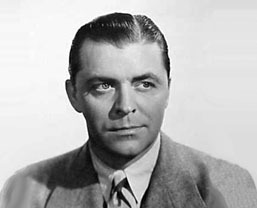
Lucky Lyle TalbotPosted on January 15, 2013 by Bill PeschelEd here: Bill Peschel is always good but he's especially so with this review of the book about Lyle Talbot, a man who had a fascinating if dogged LONG showbiz career.. In his long lifetime that spanned the history of popular entertainment, Lyle Talbot believed he was lucky. The former carnie hustler and stage actor on the Midwestern circuit never became a star despite a contract at Warners playing opposite Bette Davis, Humphrey Bogart and Mae West. A fading career and drink threatened to ruin him like it did many other actors, but a successful marriage and fatherhood rescued him, television revived his career and playing Ozzie Nelson’s neighbor gave him a modicum of immortality. Luck? If that meant working steadily in a chaotic profession, then the former Lisle Henderson had it in spades.Even now, forgotten by all but movie buffs, his luck holds. His daughter, “New Yorker” reporter Margaret Talbot, has written “The Entertainer: Movies, Magic, and My Father’s Twentieth Century
 ,” an engaging, anecdote-stuffed and affectionate portrait of a sweet man and the culture that shaped and fed him. For sheer entertainment value, it’s one of the best biographies I’ve read in a long time.Talbot grew up in Nebraska, after his mother died in childbirth and his father was chased off by Lyle’s flinty grandmother. He was raised in her hotel that catered to traveling salesmen of the kind seen in “The Music Man.”It was a childhood that left peculiar marks. His grandmother would mourn her dead daughter by pinching young Lyle until he cried with her. He would be allowed to spend the night — chaste — with the young maids, who didn’t find it peculiar to accept a boy into their warm beds.It was there, in the back-of-beyond Midwest, that he discovered a love of entertaining and the traveling troupes that provided it. This leads into one of Margaret Talbot’s many digressions. Digging into obscure memoirs and histories, she revives the long-lost stories of the colorful, eccentric characters who struggled to pursue their dreams. In an era before radio and movies, carneys, circuses and companies of actors would ride the rails, rivers and roads from small town to small town. During winter, the ice-bound waterways acted as interstates with horses pulling the boats on runners. One playful group used a castle backdrop as a sail and held mock swordfights in front of it, to break the monotony and entertain anyone on shore.for the rest go here: http://planetpeschel.com/wp/
,” an engaging, anecdote-stuffed and affectionate portrait of a sweet man and the culture that shaped and fed him. For sheer entertainment value, it’s one of the best biographies I’ve read in a long time.Talbot grew up in Nebraska, after his mother died in childbirth and his father was chased off by Lyle’s flinty grandmother. He was raised in her hotel that catered to traveling salesmen of the kind seen in “The Music Man.”It was a childhood that left peculiar marks. His grandmother would mourn her dead daughter by pinching young Lyle until he cried with her. He would be allowed to spend the night — chaste — with the young maids, who didn’t find it peculiar to accept a boy into their warm beds.It was there, in the back-of-beyond Midwest, that he discovered a love of entertaining and the traveling troupes that provided it. This leads into one of Margaret Talbot’s many digressions. Digging into obscure memoirs and histories, she revives the long-lost stories of the colorful, eccentric characters who struggled to pursue their dreams. In an era before radio and movies, carneys, circuses and companies of actors would ride the rails, rivers and roads from small town to small town. During winter, the ice-bound waterways acted as interstates with horses pulling the boats on runners. One playful group used a castle backdrop as a sail and held mock swordfights in front of it, to break the monotony and entertain anyone on shore.for the rest go here: http://planetpeschel.com/wp/Posted in Biography, Hollywood Book Reviews | Comments Off
Published on January 15, 2013 15:07
January 14, 2013
Seduction of The Innocent by Max Allan Collins
Fi

So Doctor Fredric Wertham finally gets his.
Max Allan Collins’ sleek new novel Seduction of The Innocent takes us back to the days when Wertham and the United States Congress were trying to win public approval by insisting that certain suspense and horror comic books were actually training manuals for all sorts of violence and perversion. Did Batman and Robin sleep in the same bed?
Werthman was an allegedly respectable psychiatrist whose book Seduction of The Innocent won him fame and most likely moderate fortune. He appears in Collins' novel as Dr. Werner Frederick, a lightweight egotist lusting for celebrity.
I suppose that this is my favorite of the Jack and Maggie Starr adventures because of the theme. I was just old enough to buy EC comics on the news stands and I have a dim memory of them suddenly disappearing from the store where I bought comics and science fiction magazines. The Starr family is involved in Dr. Frederick's campaign because their distribution company is about to purchase one of the offending comic book companies from a turbulent man named Bob Price.
For me Price is the most memorable character in the novel. He is determined to testify--as a volunteer no less--before the Senate Committee despite Jack, Maggie, his business partner and anybody else who has ever had contact with him begging him not to. You find yourself begging him not to along with everybody else. He's about to commit business suicide but nobody can stop him. He will bluster and rant his way into buffoonery or worse. I could see the late Jack Carson playing him beautifully.
Meanwhile Jack Starr, being among other things a private detective, begins to do a background check on Frederick hoping to come up with a way to diminish his power. A particularly clever turn as things turn out.
As usual, Collins is spot on in bringing back the Fifties, especially the Fifties of New York and some of its tonier spots and characters. He has a lot of fun with the personalities and the shows and the obsessions of the era.
There's a particularly suspenseful scene early on in a chi chi restaurant where a celebrity (just ask him) holds forth with a microphone as he interviews other celebrities in his private booth. He traps Maggie into an ugly interrogation. The scene works well as drama but also as a satire on early TV--you think reality shows are cheap to produce; stash some yo-yo in a restaurant booth with a microphone and have him fill a half hour. The change in your pocket will pay the freight.
But the thrust of the novel is how corrupt the entire investigation into comic books was. From a clownish shrink to grandstanding Senators to a national press eager to play scolding minister. Collins mixes this with a really tight fair-clue mystery, a private detective story (is there just a bit of Shell Scott in Jack Starr?) and the kind of superior storytelling that mark every Collins book.
A final note on the interior illustrations by Terry Beatty. These capture the mood and era of the novel perfectly. Beatty is among the very best illustrators of our time and his homage to the original EC drawings is magnificent.
Five stars for the Starrs.
Published on January 14, 2013 11:30
January 13, 2013
Another Look: Savages by Bill Pronzini
SAVAGES by Bill PronziniF. Paul Wilson once noted that private eye fiction offers the reader a snapshot of a certain time and place. We read Raymond Chandler not only for his fine prose but also for his portraits of Hollywood in the Thirties and Forties. Ross Macdonald showed us a very different Los Angeles due to the differences in time and temperment. And if you want to know what it was like on the angry lower-class streets of Depression Hollywoodland, you could do worse than read a lesser writer named John K. Butler, whose hardboiled cab driver functioned as a private eye without a license.
Today the definitive take on San Francisco and environs are the Nameless novels and stories by Bill Pronzini. The influence here, if there is a singuar one, would be Hammett and not Chandler. Nameless is working class, competent and only occasionally up for doing the kind of favors that the more romantic Marlowe did so often. Nameless, like the Contintental Op, is a professional not a dashing knight.
A few decades from now the Nameless books will give readers a fascinating look at the past thirty-forty years of life in San Francisco. The social upheavels, the econmically and culturally stratified society, the endless experiments in modern living.
And you can find all this and much more in the latest Nameless novel SAVAGES. Pronzini tells three stories here. He goes back to work for a wealthy client he never much liked only after she convinces him that there's at least a possibility that her sister was murdered by her husband, a man Nameless couldn't turn anything sinister about when he first investigated him. Nameless not only comes to suspect the husband but several other people who were in the life of the dead woman. He draws these characters with clear and deserved contempt.
The second story deals with an arsonist pursued by Jake Runyon, the partner in Nameless' agency. The trail leads him to a small town where the feel is that of a western town of a hundred years ago. Pronzini, writer of many fine westerns, seems especially at home here with the good lawman and the bad lawman and the townspeople eager to get stampeded into believing any piece of gossip they hear. Interesting that he mixes this sensibility with that of young people into drugs, violence and MTV ennui.
The third story concerns Nameless' woman Kerry and the aftermath of her surgery for breast cancer. She's been pronounced all right but nobody who's had cancer ever quite believes that. Pronzini is especially adept at dealing realistically and unsentimentally with the subject.
Thus we encounter three kinds of savages here--those of the city elite--those of rural blue collar life--and those of the human body, the cancer cells that destroy without fear or favor.
Another excellent entry in one of the most consistently excellent series of the past forty years.
Published on January 13, 2013 12:34
January 12, 2013
Elvis Meets Rock Royalty
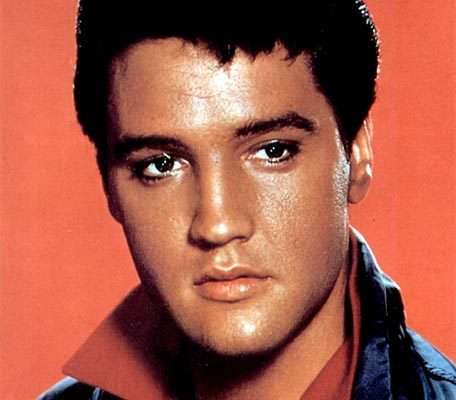
Ed here: Spinner magazine (Huff Post link) published an article about Elvis meeting some rock celebrities over the years. For the article in all its splendor go here: http://www.spinner.com/2013/01/08/elv...
Alice Cooper
When Cooper arrived at Presley's Vegas penthouse in the early '70s with Liza Minnelli, Chubby Checker and porn star Linda Lovelace -- all invited by Elvis -- he was frisked by a security team. Despite that, Cooper would wind up with a gun in his hand, pointed at Presley.
"Elvis took me into the kitchen, opened a drawer, and pulled out a loaded pistol, telling me to put it to his head," Cooper told the London Mirror.
Fearing what the security guards would do if they saw him pointing a .32-caliber gun at their boss, the famously macabre Cooper said he felt conflicted.
"A little voice in my left ear was telling me, 'Go on, this is history -- kill him. You'll always be the guy who killed Elvis.'" That's when he encountered Presley's karate training.
"A fraction of a second later Elvis did a flying kick on the gun and sent it flying, before tripping me and pinning me to the ground by my neck, announcing, 'That's how you stop a man with a gun.'"
The Beatles
After many unsuccessful attempts to meet their hero, the Beatles decided when it finally did happen -- on Aug. 27, 1965 -- there'd be no circus. No leaks to the press, no photos and no recordings.
The Fab Four, who were touring the U.S. at the time, met Presley at his Bel Air mansion, where he was sitting on a couch, watching TV while playing a bass guitar, according to "The Beatles Anthology."
"That was the great thing for me," Paul McCartney said. "That he was into the bass. So there I was, 'Well, let me show you a thing or two, El ...' Suddenly, he was a mate."
The Beatles played pool with some of Elvis' friends and eventually met his wife, Priscilla. (John Lennon said he and Elvis jammed a bit, according to the other Beatles.)
Years later, Presley tried to get the Beatles banished from America, telling President Richard Nixon that the Beatles were un-American drug users.
"I felt a bit betrayed by that," McCartney said.
Published on January 12, 2013 13:24
Ed Gorman's Blog
- Ed Gorman's profile
- 118 followers
Ed Gorman isn't a Goodreads Author
(yet),
but they
do have a blog,
so here are some recent posts imported from
their feed.



